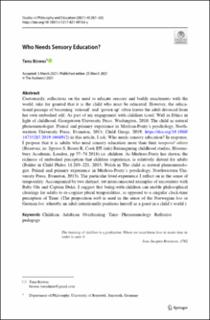| dc.contributor.author | Biswas, Tanu | |
| dc.date.accessioned | 2021-10-07T12:32:01Z | |
| dc.date.available | 2021-10-07T12:32:01Z | |
| dc.date.created | 2021-10-01T19:22:29Z | |
| dc.date.issued | 2021-03 | |
| dc.identifier.citation | Biswas, T. (2021) Who needs sensory education?. Studies in Philosophy and Education, 40, pp. 287–302 | en_US |
| dc.identifier.issn | 0039-3746 | |
| dc.identifier.uri | https://hdl.handle.net/11250/2788422 | |
| dc.description.abstract | Customarily, reflections on the need to educate sensory and bodily enactments with the world, take for granted that it is the child who must be educated. However, the educational passage of becoming 'rational' and 'grown up' often leaves the adult divorced from her own embodied self. As part of my engagement with childism (conf. Wall 2010) in this article, I ask: Who needs sensory education? In response, I propose that it is adults who need sensory education more than their temporal others (Beauvais 2018) i.e. children. As Merleau-Ponty has shown, the richness of embodied perception that children experience, is relatively distant for adults (Bahler 2015; Welsh 2013). The particular lived-experience I reflect on is the sense of temporality. Accompanied by two distinct, yet interconnected examples of encounters with Baby Ole and Captain Duke, I suggest that being-with-children can enable philosophical clearings for adults to re-cognise plural temporalities, as opposed to a singular clock-time perception of Time. (The preposition with is used in the sense of the Norwegian hos or German bei, whereby an adult intentionally positions herself as a guest in a child's world.) | en_US |
| dc.language.iso | eng | en_US |
| dc.publisher | Springer Nature Switzerland AG | en_US |
| dc.rights | Navngivelse 4.0 Internasjonal | * |
| dc.rights.uri | http://creativecommons.org/licenses/by/4.0/deed.no | * |
| dc.subject | utdanningsvitenskap | en_US |
| dc.subject | pedagogikk | en_US |
| dc.title | Who needs sensory education? | en_US |
| dc.type | Peer reviewed | en_US |
| dc.type | Journal article | en_US |
| dc.description.version | publishedVersion | en_US |
| dc.rights.holder | © The Author(s) 2021 | en_US |
| dc.subject.nsi | VDP::Samfunnsvitenskap: 200::Pedagogiske fag: 280 | en_US |
| dc.source.pagenumber | 287–302 | en_US |
| dc.source.volume | 40 | en_US |
| dc.source.journal | Studies in Philosophy and Education | en_US |
| dc.identifier.doi | 10.1007/s11217-021-09763-y | |
| dc.identifier.cristin | 1942483 | |
| cristin.ispublished | true | |
| cristin.fulltext | original | |
| cristin.qualitycode | 2 | |

